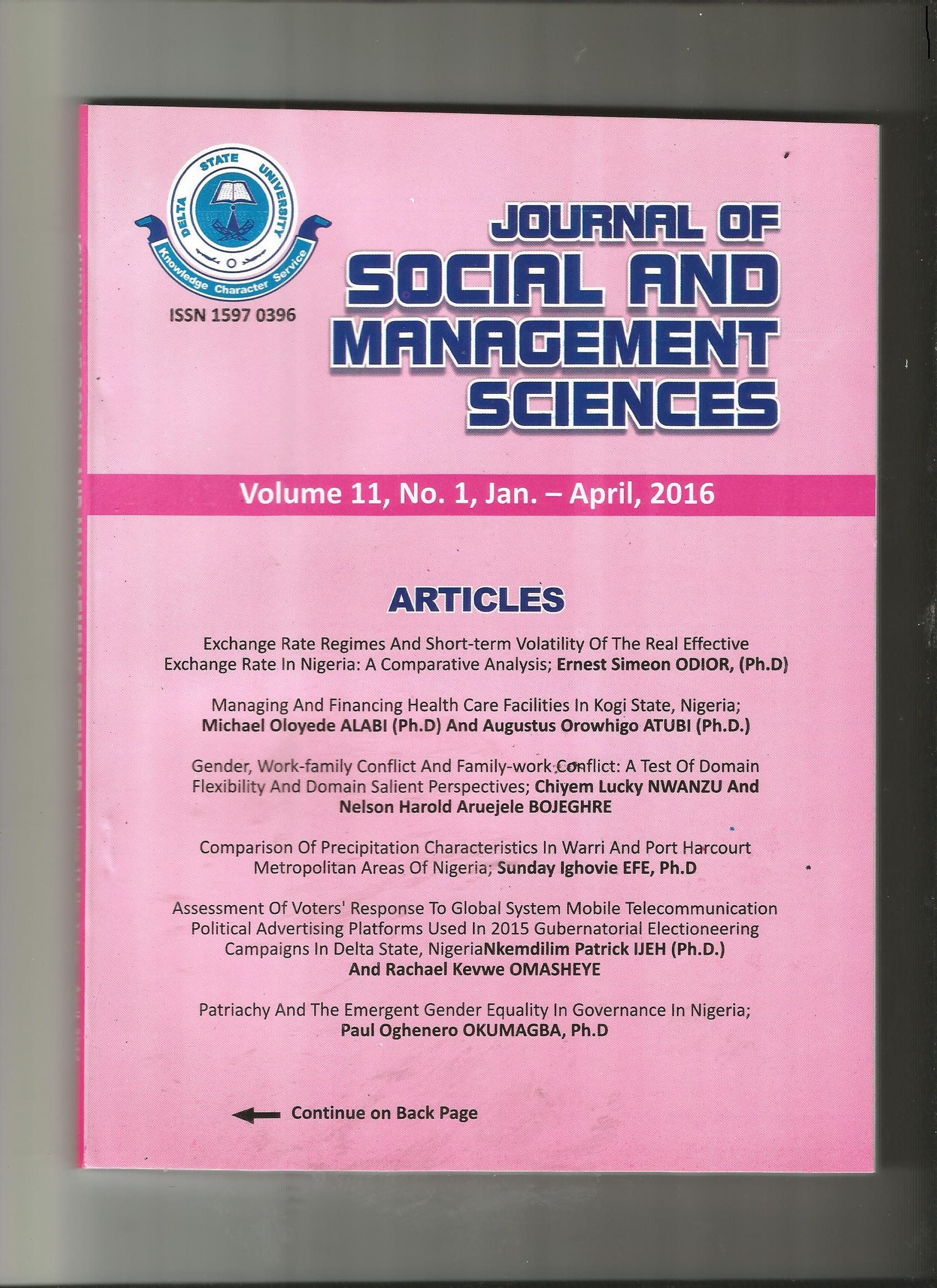
JOURNAL OF SOCIAL AND MANAGEMENT SCIENCES
Journal of the Faculty of Social Sciences, Delta State University, Abraka, Nigeria
ISSN: 1597-0396
DOI: 10.5987/UJ-JSMS
Email: jsms@universityjournals.org
GENDER AS A CORRELATE OF NEW MEDIA USAGE FOR ECONOMIC ACTIVITIES BY YOUTHS IN DELTA CENTRAL SENATORIAL DISTRICT
DOI: 10.5987/UJ-JSMS.17.048.3 | Article Number: 0D44277 | Vol.11 (3) - December 2016
Author: UFUOPHU-BIRI Emmanuel
Keywords: Nigeria, Youth, New Media
The mew media are the modern digital tools and processes used for communication content creation, production, storage and distribution. Communication in this sense cuts across the mass media, politics, social, cultural, economic, commerce, education, advocacy, among others. The new media are used prominently for economic purposes and a good number of youths have employed them for economic benefits. However, there has been argument as to gender being a significant correlate of new media usage for economic purpose among the youths. This study therefore, interrogated the correlation between new media usage for economic activities by youths in Delta Central Senatorial District metropolis. This study is hinged on the Technology Acceptance Model, which explains the user's intentions to use an information system/technology and subsequent usage behaviour. Survey and questionnaire were used as the method and instrument respectively. Stratified and random sampling techniques were adopted, while nonparametric and inferential statistics were used for the data analysis. The study found low level of new media usage by youths in Delta Central Senatorial District metropolis for economic activities. The study recommends that youths, irrespective of gender, should be encouraged to use the new media for economic benefits.
Arreymbi, J. and Agbor, E.A. (2008). Information Communications Technology (ICT) Effect on Sustainable Development in Cameroon's Fragile Economy. 1 (1).
Broos, A. (2005). Gender and information and communication technologies (ICT) anxiety: male self-assurance and female hesitation. Cyberpsychology Behavior. 8(1):21-31.
Caincross, F. (2001). The Death of Distance: How the Communications Revolution is changing our lives. London: Texere Publishing Limited.
De Beer, A. (2001). The Internet in Africaa new road to development opportunities or a digital highway leading to nowhere? Critical Arts: A SouthNorth Journal of Cultural and Media Studies,15(1&2), 135153.
Farhadi, M. Ismail, R. and Fooladi, M. (2012). Information and Communication Technology use and Economic Growth. PLOS ONE 7(11) 8-17.
Farrokh, M. (2010). The Social and Economic Impact of Information and Communication Technology on Developing Countries: An Analysis International Journal of Management. 27 (3).
Faux, E. (2005). Information technology (IT) and economic development: The African context. Journal of African Social Sciences and Humanities, 1(1),4477.
Ghosh, M and Ghosh, I (2009). ICT and information strategies for a knowledge economy: the Indian experience. Program. 43 (2) 187 - 201
Hilbert, M. (2011). Digital gender divide or technologically empowered women in developing countries? A typical case of lies, damned lies, and statistics. Women's Studies International Forum, 34(6), 479-489.
Kearney, A.T. (2005) Assessment of Egypt's Potential as a Competitive Location for Offshore Services, Market Study Report.
Langmia, K. (2005). The role of ICT in the economic development of Africa: The case of South Africa International Journal of Education and Development using Information and Communication Technology. (4)144156.
Morawczynski, O and Ngwenyama, O. (2007) Unraveling the Impact of Investments in ICT, Education and Health of Development: An Analysis of Archival Data of Five West African Countries Using Regression Splines, Electronic Journal of Information Systems in Developing Countries, 29, 5, 1-15.
Mottin-Sylla, M.H. (2005) The gender digital divide in Francophone Africa: A harsh reality. Dakar: ENDA Third World. ISBN 92-95049-11.
Rabayah, K.S., (2009)Economic and social empowerment of women through ICT: A case of Palastine. The Journal of Community Informatics. 5 (3). 41-54.
Rahman, A., Abdullah, M.N., Haroon, A and Tooheen, R.B. (2013). ICT impact on socio-economic conditions of rural Bangladesh. Journal of World Economic Research 2013; 2(1): 1-8
Roy, S., Ahmed, AM.B., Abonamah (2014). ICT and Economic Growth: Evidence from Twelve MENA Economies. International Journal of Customer Relationship Marketing and Management 5(1). 24-36
Tawil, M.E, Rateb, D and Karnel, S. (2009). The implication of ICT investment economic development in Egypt. The International Journal of Systems in Developing Countries (36) 11-21.
Warner, B. (2012). How much money has PSY made off Gangnam style? Accessed on December 20, 2 0 1 4 f r o m :http://www.celebritynetworth.com/articles/celebrity/money-psy-gangnam-style/
Zainudeen, A., Iqbal, T., Samarajiva, R. & Ratnadiwakara, D. (2008) Who's got the phone? Gender and the use of the telephone at the bottom of the pyramid. Paper presented at 2008 International Communications Association conference, Montreal, Canada, 26 May 2008.
